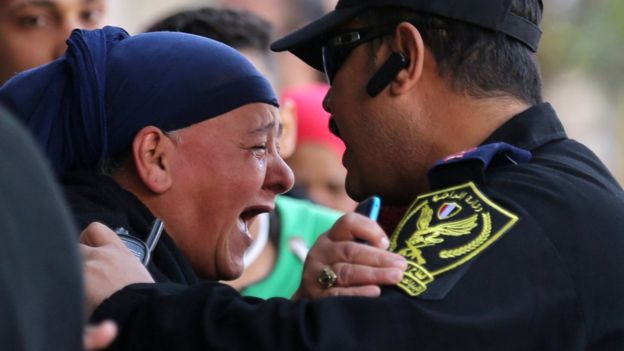
Police officers cordoned off the area from family members and other churchgoers after the bombing of a Coptic church. (Reuters)
In 2017, we may see more of the assault on the ancient minority communities in the Middle East. Another major attack on the Coptic community in Egypt this week set targeted its most important Church in Cairo, and there is little doubt that the mass causalities of women and children was done with intent.
Attacks on these ancient communities in the region often focus on women and children, as one of the main goals is not just murder members of these minorities, but to wipe out future generations through death, submission or conversion out of their faith and culture.
The attack on Christians in the Middle East, and other minority communities such as Yazidis, attempt to destroy the present and future of some of the oldest cultures in the region.
A renewed assault on Palmyra by the Islamic State may have some connections to this genocidal policy. Palmyra has been re-taken by an assault of 4,000 ISIS fighters on the ancient city. While Aleppo, Raqqa and Mosul would be the logical destination for re-enforcements, as they are in the midst of being recaptured by local government forces, Palmyra has been targeted for further destruction.
One of the reasons Palmyra is a target lies in its historical significance. Actions by ISIS aim at erasing the history of minority and historical communities in the region, leaving not a shred of evidence to their existence, despite them being some of the oldest surviving communities.
Although Western countries have an obligation to stop genocide, they have continuously failed. While bickering about less urgent issues continues, minority communities are being wiped out and have received little to no support on the ground until recently.
The government of Canada—one that loves to receive praise by the international community on its humanitarian efforts—was revealed to only having brought in three or four Yazidis in their push to bring in over 30,000 refugees from the region.
After Nadia Murad came to Canada to plead for an increased push to bring in more Yazidis, Canadian authorities declared they would only bring in 50 people in total, despite committing to bringing in tens of thousands of more refugees from the region. This is significant less than what independent Canadian NGOs have brought into the country without government support.
A great analysis and approach to how Western governments should address genocide in the Middle East was produced this past weekend. It reflects the lack of effort from Western nations in their commitment to end genocide in the region. The conference can be seen on the One Free World International’s Facebook page under the December 10th 2016 Celebrating Freedom video link.
2017 will either be the year in which governments decide to stop genocide in the region or let it continue. This will impact how future generations, seeing us all as the ones who allowed such atrocities to become normalized.